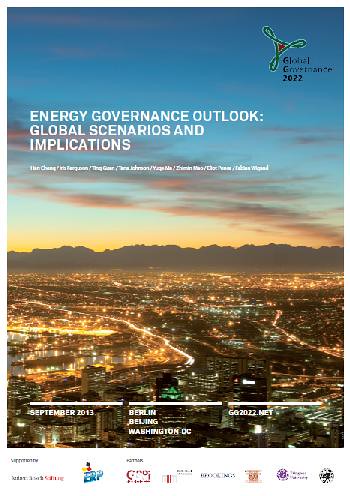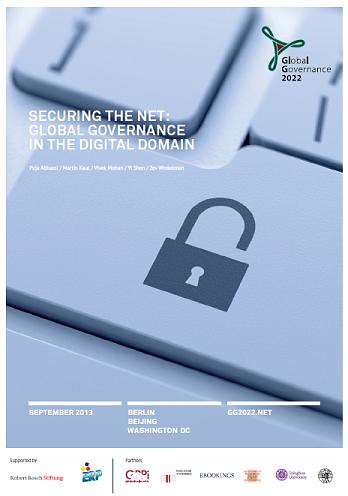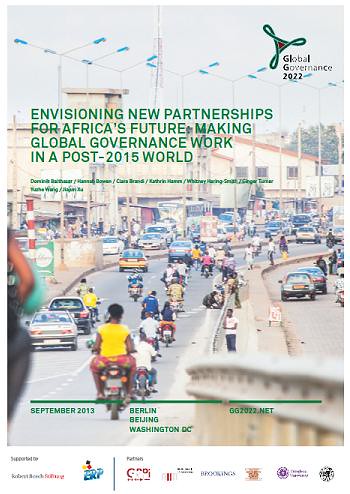The Global Governance 2022 program (known as GG2022) is a series of dialogues focusing on the possible futures of global governance and how the international institutions can prepare for challenges and risks in an uncertain future.
Over the course of almost nine months in 2012-2013, the program comprises three dialogue sessions in Berlin (26-30 August 2012), Beijing (7-11 January 2013) and Washington, DC (5-9 May 2013). It brings together 24 young leaders from China, Germany and the United States – the GG2022 fellows. Over the course of the program, the fellows will forge cross-cultural networks and, using the intellectual instruments in the field of future research, devise scenarios for the future of international institutions in the three areas of cyber security, development and energy governance. They will be encouraged to combine their insights on possible future developments with their normative convictions about the shape and role of global governance in order to create a shared vision of the future system of global governance.
The GG2022 program is jointly organized by the Global Public Policy Institute, the Hertie School of Governance, Brookings Institution, the Woodrow Wilson School at Princeton University, Tsinghua University and Fudan University. GG2022 is generously supported by Robert Bosch Stiftung and the Transatlantic Program of the German government (ERP Grant administered by the German Ministry for Economics and Technology).
G2022 Fellows' Columns and Reports
The following reports and columns represent the opinions of the 24 young GG2022 fellows from China, Germany and the United States. The fellows’ contributions focus on various topics from the core policy areas of the program - energy, cyber security and development governance as well as global governance more broadly:
Introduction:
New Thinking for Global Governance Needed by Johannes Gabriel and Joel Sandhu 
Cyber Security:
A Chain is Just as Strong as its Weakest Link - A Call for Better Education in Cyber Security by Puja Abbassi
Homecoming of the Internet by Martin Kaul
All Quiet on the Cyber Front? The Twisted Logic of Cyber Security...by Mark T. Fliegauf
Global Cyber (Security) Governance – Facing a Decisive by Joachim Knodt
Energy:
Connecting Systems: EU’s Internal Energy Market and Future Cooperation with MENA by Fabian Wigand
Development Governance:
Diplomatic Business: Engaging Corporations in Global Policy by Whitney Haring-Smith
‘Fragile States’ and ‘Failed Policies’: Two Global Public Policy Challenges at Eye Level by Dominik Balthasar
Think Different Development by Eliot Pence
Key Ingredients for the Post-2015 Development Agenda by Clara Brandi
Energy Governance Outlook: Global Scenarios and Implications
This report summarizes the work of the GG2022 working group on global energy governance. To explore possible futures in global energy governance, the working group used a scenario planning methodology with techniques developed extensively in the field of future studies. The diverse nationalities, backgrounds, and expertise of working group members contributed crucial assets for devising national strategies and solutions.
Securing the Net: Global Governance in the Digital Domain
This report summarizes the work of the GG2022 working group on global cyber security governance. To explore possible futures in global cyber security governance, the working group used a scenario planning methodology with techniques developed extensively in the field of future studies. The diverse nationalities, backgrounds, and expertise of working group members contributed crucial assets for devising national strategies and solutions.
Envisioning New Partnerships For Africa’s Future: Making Global Governance Work in a Post-2015 World
This report summarizes the work of the GG2022 working group on global development governance. To explore possible futures in global development, the working group used a scenario planning methodology with techniques developed extensively in the field of future studies. The diverse nationalities, backgrounds, and expertise of working group members contributed crucial assets for devising national strategies and solutions.


